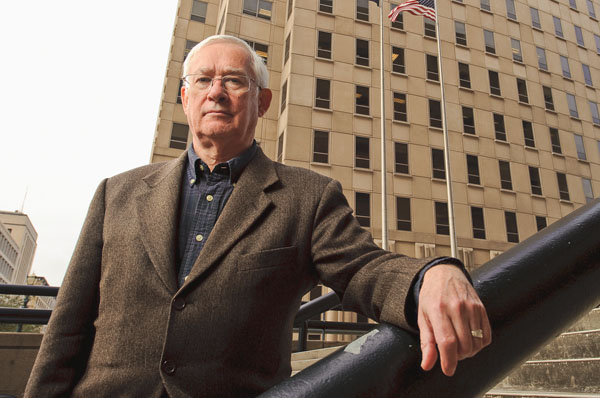Alumni Gazette
 ALTERED STATE: The population of Texas is changing, and with that, so are attitudes about the death penalty, Atwood says. (Photo: AP Images/David Einsel for Rochester Review)
ALTERED STATE: The population of Texas is changing, and with that, so are attitudes about the death penalty, Atwood says. (Photo: AP Images/David Einsel for Rochester Review)Sister Helen Prejean, author of Dead Men Walking, has called him “an inspiration.” Supporters of the Texas victims’ rights group Justice for All have called him “a murderer lover.”
David Atwood ’63, a self-described “death penalty abolitionist,” provokes strong reactions for a man often described as soft-spoken. A longtime activist in Catholic peace and social justice organizations, he launched the Texas Coalition to Abolish the Death Penalty 15 years ago in Houston.
Today, as he travels around the state speaking to church, school, and civic groups, he finds Texans are more receptive to the coalition’s message: that the death penalty is not a deterrent, that it’s administered unfairly, and that it has sent people to death row who later were exonerated and released.
“Most people are wanting to get more information and are wanting to learn,” says Atwood. “They may say initially that they’re for the death penalty. But many times when they get more information, they’ll change their minds.”
In 2005, the national group with which the Texas coalition is affiliated honored Atwood with its Lighting the Torch of Conscience Award, citing his role as lead organizer of the Texas Journey of Hope. The journey is a statewide anti-death penalty speaking tour by family members of murder victims, death row inmates, and exonerated inmates designed to “touch hearts and change minds.”
Getting people to think more deeply about the death penalty was the goal of Atwood’s 2008 book, Detour to Death Row (PeaceCenter Books), in which he recounted his interaction with inmates, their circumstances, and the relationships he has developed with them, their families, and the families of their victims.
Allan Turner, a reporter for the Houston Chronicle who has observed Atwood for years, calls Atwood’s approach “low key.”
“Dave is highly respected as a sober, thoughtful person. He’s not going to be engaging in verbal street theater,” Turner says.
There is arguably no anti-death penalty activist with a more daunting task than Atwood’s. In the past quarter century, more than one third of all prisoner executions in the United States have taken place in Texas. Of those executions, one quarter have taken place in a single county: Harris County, home of Houston, where Atwood and his wife, Priscilla McKendrick Atwood ’63N, have lived since the early 1970s, and where they have raised six children.
Atwood attributes those statistics in large part to powerful and well-funded district attorneys who are virtually unanimous in their support for the death penalty.
But he also believes their days of power are numbered. “People are moving into this state, and it’s changing.”
In 2005, for example, the Texas legislature passed a law granting juries the option of life imprisonment without parole—over the objections of Harris County’s district attorney.
Atwood was at the cusp of that transformation. A chemical engineer, he began working for the Shell oil company in Trenton, N.J., and relocated when the company moved its headquarters to Houston in 1971.
Atwood describes Houston in those days as “an old southern city.” To ease his adjustment, he turned to his church and its social causes. His transformation was radical. In 1974, his family abandoned their suburban home to live close to the city’s impoverished Fourth Ward, near the free health clinic where the Atwoods volunteered.
In 1991, David retired from Shell and began to research the death penalty. “There was a real vacuum,” he says, “of leadership and action against it.”
He acknowledges the inmates’ crimes are often brutal. “I have struggled sometimes just in reading about them. Most guys on death row have committed an atrocious crime.”
Another struggle comes after he talks with inmates and their families.
“You go in and you start talking with a person, and he seems like a normal human being.”
“One of the hardest things for a person like me, when there’s an execution, is being there with the family of the person being executed.” Atwood has stood vigil with family members over 100 times and has witnessed three executions.
In 2009, Texas handed down nine death sentences, a historic low. Citing polls showing Texans are cooling to the death penalty, Atwood says, “politicians have used the death penalty to get a political advantage. I think that advantage is disappearing.”
Abolition, he says, “is on its way.”

